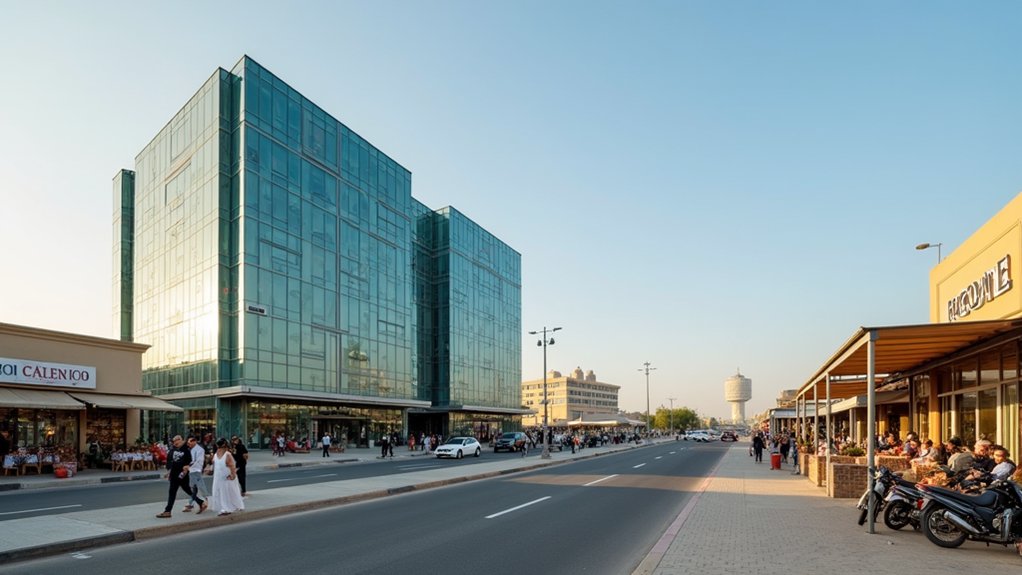Yes, you can convert a Dubai South Free Zone company into a mainland business. This shift allows you to access local markets and gain additional operational advantages. To do this, you'll need to obtain a No Objection Certificate (NOC) from the free zone authority. After that, cancel your free zone license and apply for a mainland trade license. Remember, a local Emirati sponsor is required, along with compliant office space. While there are associated costs and documentation, this move can enhance your business's market potential and credibility. For more insights on the process, consider exploring further details.
Overview of Free Zone vs. Mainland

When you're deciding between a Dubai South Free Zone and a mainland company, understanding their key differences can considerably impact your business strategy. Free zone companies, like those in Dubai South, can operate within the free zone and internationally, offering benefits like 100% foreign ownership and tax exemptions. However, they can't engage directly with local markets. In contrast, a mainland business can operate throughout the UAE but requires a local Emirati sponsor holding at least 51% ownership. Additionally, mainland companies must have a physical office space that meets Ejari requirements. If you wish to convert your free zone company, you'll need to obtain a No Objection Certificate (NOC) from the free zone authority and comply with local regulations. To facilitate this transition, it is advisable to consult with professional business consultants(#) who are well-versed in navigating both free zone and mainland regulatory environments.
Advantages of Mainland Operations
Operating on the mainland offers significant advantages that can elevate your business strategy. Mainland companies enjoy unrestricted access to the broader UAE market, allowing you to trade freely across all emirates. This direct engagement with local customers boosts your business operations. Additionally, you can sponsor employee visas without limitations, making it easier to hire global talent. Shifting to the mainland can lower operational costs, such as reduced office rental fees, enhancing your profitability. You'll also gain access to government contracts and grants often unavailable to free zone companies, providing further growth opportunities. Finally, the flexible auditing regulations help you maintain better control over your financial practices, aiding in compliance and operational efficiency as a corporate entity. Furthermore, with the 100% foreign ownership(100% foreign ownership allowed in mainland businesses) allowed, international investors can maintain full control of their companies, facilitating smoother management and decision-making processes.
Legal Framework for Conversion

To successfully convert your business from the Dubai South Free Zone to the mainland, you must navigate a specific legal framework established by the Department of Economic Development (DED) in Dubai. The first step in the conversion process is obtaining a No Objection Certificate (NOC) from the free zone authority. Next, you'll need to cancel your free zone license and apply for a new mainland trade license that complies with local regulations. This often includes securing local ownership, typically requiring at least 51% Emirati ownership for certain activities. You'll also need to gather necessary documents, such as the Memorandum of Association and proof of compliant office space. Throughout this process, guarantee you maintain compliance with UAE laws to avoid any issues. Additionally, it is important to understand that transitioning from a free zone company to a mainland business may affect your tax benefits, as free zones often provide tax exemptions that do not apply on the mainland.
Eligibility Criteria for Transition
Successfully steering through the legal framework for converting your Dubai South Free Zone company paves the way for understanding the eligibility criteria needed for the change to a mainland business. To begin the conversion process, you must obtain a No Objection Certificate (NOC) from the Dubai South Free Zone authority. Additionally, you'll need to cancel your free zone license and apply for a new mainland license through the Department of Economic Development (DED). A local Emirati sponsor may be required for certain business activities. It's also essential to meet the minimum capital requirements set by local regulations. This transition allows businesses to tap into the UAE market, providing broader opportunities for market competition and consumer access.
Necessary Documentation for Transfer
When converting your Dubai South Free Zone company to a mainland business, you'll need to gather several essential documents to guarantee a smooth transfer process. First, obtain a No Objection Certificate (NOC) from the Dubai South Free Zone authority. You'll also need your existing trade license, memorandum of association, and proof of office space that complies with Ejari regulations. Additional necessary documents include passport copies of shareholders and directors, a resolution for changing the business structure, and your financial statements. It's vital to settle any outstanding fees and liabilities with the free zone to avoid complications. After submitting these necessary documents, the Department of Economic Development (DED) will review them and issue a new mainland trade license upon approval. To ensure compliance and avoid penalties, remember that trade licenses typically require annual renewal, a rule that applies universally across the UAE.
Step-by-Step Transfer Process
To start the transfer process, you need to verify exit conditions with the free zone authority to guarantee there are no outstanding liabilities. Next, you'll file an application to cancel your free zone license and obtain a No Objection Certificate. These steps are essential as they set the foundation for your shift to a mainland business.
Verify Exit Conditions
Verifying exit conditions is essential for a smooth changeover from Dubai South Free Zone to a mainland business. Before you start the process, confirm you:
- Settle all outstanding liabilities with the free zone authority.
- Obtain a No Objection Certificate (NOC), which is mandatory for the transfer.
- Comply with any necessary approvals from the Dubai South Free Zone.
- Review your company structure and activities to confirm they align with mainland regulations.
Taking these steps will help you avoid complications later on. Make certain that all your financial statements and business plans are in order. This way, you can facilitate a seamless changeover to the mainland, and your business can continue to thrive without any hitches.
Obtain Necessary Documentation
Obtaining the necessary documentation is crucial for a successful shift from a Dubai South Free Zone company to a mainland business. First, secure a No Objection Certificate (NOC) from the free zone authority. This document is essential for starting the transfer process. Next, you'll need to cancel your existing free zone license by submitting a cancellation application and settling any outstanding fees. After that, apply for a new mainland license through the Department of Economic Development (DED). Prepare key documentation, including the Memorandum of Association, proof of office lease, and identification documents of shareholders. Confirm compliance with local sponsorship requirements, as a local Emirati sponsor might be needed. Finally, stay on top of regulatory compliance for ongoing obligations.
Costs and Fees Associated
When converting a Dubai South Free Zone company to a mainland business, you'll encounter several costs that can add up quickly. Consider these key expenses:
- Cancellation fees for your existing free zone license, varying by regulations
- Licensing fees from the Department of Economic Development (AED 1,000 to AED 15,000)
- Higher office rental costs for Ejari-compliant spaces in mainland Dubai
- Visa fees for employees, ranging from AED 1,000 to AED 3,000 each
These costs, along with any outstanding fees or penalties from the free zone, can make the changeover more expensive than anticipated. Planning for these fees will help guarantee a smoother conversion to a mainland business license.
Regulatory Approvals Required
Converting your Dubai South Free Zone company to a mainland business involves steering through several regulatory approvals. First, you need to obtain a No Objection Certificate (NOC) from the Dubai South Free Zone authority. After that, you must cancel your existing free zone license before applying for a new trade license with the Department of Economic Development (DED). During this process, you'll also need to prepare documentation, including the Memorandum of Association and proof of office space that meets Ejari regulations. It's essential that your proposed business activities align with those allowed under free zone regulations. Any discrepancies can lead to delays in obtaining the necessary regulatory approvals, so verify that everything is in order before proceeding.
Local Sponsorship Requirements
Shifting your Dubai South Free Zone company to a mainland business requires securing a local Emirati sponsor, who will hold at least 51% ownership in your new entity. This local sponsor must be a UAE national or a fully owned UAE company. Consider these key aspects:
- A sponsorship agreement must be documented.
- The agreement should outline responsibilities and profit-sharing.
- Local sponsorship is mandatory for most business activities.
- Verify specific regulations for your business type.
Engaging a legal consultant familiar with local laws can help guarantee compliance with sponsorship requirements. They can also streamline the shift from a free zone to a mainland setup, making the process smoother for you and your new mainland business.
Office Space Considerations
When converting your Dubai South Free Zone company to a mainland business, you'll need to secure Ejari-compliant office space to obtain your trade license. This office must be located in the UAE and can range from traditional setups to flexible workspaces, so consider your needs carefully. Keep in mind that rental costs may be higher than in free zone areas, so budgeting for this shift is essential.
Ejari-Compliant Office Requirements
To successfully operate as a mainland business in Dubai South, you need to secure an Ejari-compliant office space that meets specific regulations. Here are some key considerations:
- Your office must have a valid lease agreement.
- It needs to comply with the Department of Economic Development's minimum requirements.
- The physical office space should be appropriate for your business activities.
- Mainland businesses cannot operate solely from shared or virtual offices.
Obtaining Ejari certification is essential as it validates your lease agreement. This certification is a critical step in acquiring your trade license. By adhering to these guidelines, you guarantee that your shift from a Dubai South Free Zone company to a mainland business is smooth and compliant with local laws.
Office Space Rental Costs
Office space rental costs in Dubai can vary considerably, especially when comparing the Dubai South Free Zone to mainland areas. Renting office space in the Dubai South Free Zone typically starts at around AED 30 to AED 100 per square foot, depending on the type and location. In contrast, mainland office rental costs often range from AED 100 to AED 200 per square foot, reflecting higher demand and compliance with Ejari regulations. The Dubai South Free Zone offers flexible options like serviced offices and co-working spaces, which can lower initial rental costs for startups. If you shift to a mainland setup, you'll need to evaluate longer lease commitments and additional costs associated with utilities, maintenance, licenses, and permits.
Location Flexibility and Accessibility
How does location impact your business's accessibility and growth potential? If you're thinking about shifting from a Dubai South Free Zone to a mainland business, the location can greatly influence your operations. Here are some key points to reflect on:
- Access to broader markets
- Higher operational flexibility
- Direct engagement with customers across the UAE
- Mandatory Ejari-compliant office space
To make this shift, you'll need to secure a No Objection Certificate (NOC) from the Dubai South Free Zone authority. Afterward, you can apply for a new trade license with the Department of Economic Development (DED). Keep in mind that mainland office spaces usually have higher rental costs, so budgeting is essential for a smooth move.
Employee Visa Management
As you shift from a Dubai South Free Zone to a mainland company, managing employee visas becomes essential to guarantee compliance with local regulations. You'll need to cancel your employees' current visas and apply for new ones under the mainland license. This process must align with the Department of Economic Development (DED) rules. Be aware that the number of visas allowed depends on your office space size and legal structure. You'll also need a No Objection Certificate (NOC) from the free zone authority to facilitate the change. Additionally, budget for costs like government fees, medical examinations, and Emirates ID issuance, as these will be part of the visa transfer process during your move to the mainland.
Common Challenges During Transition
Shifting from a Dubai South Free Zone to a mainland company presents several common challenges that can complicate the process.
- Obtaining a No Objection Certificate (NOC) from the free zone authority may cause delays.
- Adapting to different regulatory compliance requirements can be tricky.
- Finding a local sponsor for the mainland business structure may pose difficulties, especially for foreign investors.
- Closing the free zone license and initiating a new mainland license can lead to unexpected costs.
These challenges can impact your business shift considerably. It's crucial to plan ahead and address these issues to guarantee a smoother process. Being aware of these potential obstacles will help you navigate the complexities of establishing a successful mainland operation.
Post-Transfer Compliance Obligations
After you transfer your business from the Dubai South Free Zone to the mainland, you'll face new compliance obligations. You'll need to secure a new trade license, adhere to local laws, and stay current on tax filing requirements. Additionally, you must maintain a compliant office space and follow labor regulations for your employees.
Ongoing Regulatory Compliance
Once you've shifted from the Dubai South Free Zone to a mainland business, guaranteeing ongoing regulatory compliance becomes essential. You'll need to focus on several key areas:
- Obtaining a mainland trade license from the Department of Economic Development (DED)
- Adhering to VAT filing requirements, especially if your annual turnover exceeds AED 375,000
- Maintaining an Ejari-compliant office space for your operations
- Aligning your business activities with DED approvals to avoid penalties
Regular audits may also be necessary to guarantee compliance with corporate tax regulations, which differ from those in free zones. By staying on top of these requirements, you can successfully navigate the complexities of mainland operations and avoid potential setbacks.
Tax Filing Requirements
How can you guarantee compliance with tax filing requirements after moving from the Dubai South Free Zone to a mainland business? First, make sure you register for a tax identification number (TIN) with the Federal Tax Authority (FTA). If your taxable supplies exceed AED 375,000 annually, you'll need to comply with VAT filing. You also must file corporate tax returns annually, with a 9% tax rate on income over AED 375,000 starting June 2023. Keeping accurate financial records for at least five years is essential for compliance. Non-compliance can result in penalties, including fines up to AED 20,000.
| Requirement | Details |
|---|---|
| VAT Filing | Required if taxable supplies > AED 375,000 |
| Corporate Tax Filing | 9% on income > AED 375,000 annually |
Licensing Maintenance Obligations
Moving your business from the Dubai South Free Zone to a mainland operation brings new licensing maintenance obligations that you must meet to stay compliant. Here are some key points to reflect on:
- Obtain a new trade license specific to mainland operations.
- Maintain an Ejari-compliant physical office space that meets local regulations.
- Adhere to ongoing compliance obligations, including VAT returns and corporate tax filings.
- Be ready for regular audits based on local laws.
These steps are vital for your business registration and avoiding penalties. Unlike your previous tax exemptions in the free zone, you'll need to navigate a different landscape of compliance obligations. Make sure you meet all licensing maintenance obligations to keep your business running smoothly and legally.
Market Access Benefits
Converting your Dubai South Free Zone company to a mainland business opens the door to unparalleled market access across the UAE. As a mainland business, you can trade directly with mainland customers, increasing your sales potential. You'll also gain access to government contracts and tenders that free zone companies often can't participate in. This change not only enhances your credibility but also allows you to benefit from cost savings due to the absence of customs duties on imports and exports. Additionally, a mainland business can sponsor employee visas without limitations, helping you attract global talent. This diversity can strengthen your workforce and improve your overall business performance in the UAE market.
Growth Opportunities After Conversion
After converting your Dubai South Free Zone company to a mainland business, you'll gain expanded market access that allows you to reach mainland customers directly. This shift also enhances operational flexibility, letting you hire a diverse workforce and secure local sponsorship. These changes can boost your revenue potential and open new avenues for growth and partnerships.
Expanded Market Access
When you shift your Dubai South Free Zone company to a mainland business, you gain unparalleled market access that can propel your growth. This change opens doors for you in ways free zone trading limitations can't.
- Engage directly with government contracts and clientele
- Eliminate barriers to access a larger customer base
- Network with other mainland businesses for strategic partnerships
- Benefit from government grants and training programs
With expanded market access, you can explore new revenue sources and expand your reach across the UAE and internationally. By becoming a mainland business, you position yourself for increased opportunities and collaborations that can greatly enhance your company's growth. This move allows you to tap into a vibrant and diverse market landscape.
Enhanced Operational Flexibility
By moving your Dubai South Free Zone company to the mainland, you access enhanced operational flexibility that fuels growth opportunities. This conversion allows you to trade freely across the UAE, reaching new markets and customers. With mainland operations, you can secure government contracts that are usually off-limits to free zone businesses, boosting your growth potential. You'll also have the ability to sponsor a wider range of employee visas, making it easier to expand your workforce. Additionally, mainland setups often come with lower operational costs, including reduced rent compared to some free zones. Access to various government grants and training programs further supports your business growth, providing valuable resources for development and success.
Consulting Services for Assistance
Steering through the complexities of converting your Dubai South Free Zone company into a mainland business can be intimidating, but consulting services can make the process much easier. Here's how they can help:
- Guide you on legal requirements for compliance.
- Assist in obtaining the No Objection Certificate (NOC) from the free zone authority.
- Navigate the documentation for the Department of Economic Development (DED) to secure your mainland license.
- Provide strategic planning to weigh the benefits and challenges of shifting.
Summary of Key Points
Converting your Dubai South Free Zone company into a mainland business involves several key steps. First, you'll need to cancel your free zone license and obtain a new trade license from the Department of Economic Development (DED). Before starting this process, securing a No Objection Certificate from the Dubai South Free Zone authority is essential. Additionally, you may need a local Emirati sponsor, as mainland businesses typically require local ownership of at least 51%. You'll also have to meet minimum capital requirements and establish a physical, Ejari-compliant office space for your mainland operations. After conversion, your mainland business will enjoy unrestricted market access across the UAE, enhancing your operational capabilities considerably compared to the free zone setup.
Frequently Asked Questions
Can Freezone Company Do Business in Mainland?
As a free zone company, you can't directly do business in the mainland without proper licensing. However, leveraging free zone benefits, you can explore mainland opportunities for business expansion, while steering through regulatory challenges for better market access.
Can Freezone Switch to Mainland?
Yes, you can switch from a free zone to a mainland business. This conversion enhances operational flexibility but requires meeting regulatory requirements, including obtaining licenses and securing a local sponsor, while also considering free zone benefits.
What Are the Disadvantages of Free Zone Companies in the UAE?
While free zones offer unique advantages, their limitations can restrict your market access, client accessibility, and pose licensing challenges. Tax implications and ongoing costs further complicate your operational flexibility and growth potential within the UAE.
How Can I Close My Free Zone Company in Dubai?
To close your free zone company in Dubai, follow closing procedures, settle financial obligations, and guarantee regulatory compliance. Submit necessary documents, obtain a No Objection Certificate, and complete the company liquidation process per legal requirements.
Conclusion
In summary, converting a Dubai South Free Zone company to a mainland business is possible and can offer significant benefits. It allows access to a larger market and greater growth opportunities. However, you must meet specific eligibility criteria and provide necessary documentation for a smooth changeover. Working with consulting services can simplify the process. This strategic move can enhance your business's potential, making it worthwhile to explore if you're considering expansion in the UAE.





